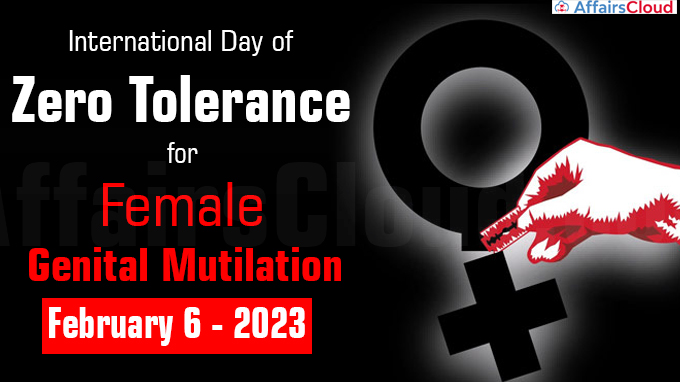 The United Nations (UN)’s International Day of Zero Tolerance for Female Genital Mutilation(FGM) is annually observed across the globe on February 6 to combat the horrific practice of female genital mutilation (FGM).
The United Nations (UN)’s International Day of Zero Tolerance for Female Genital Mutilation(FGM) is annually observed across the globe on February 6 to combat the horrific practice of female genital mutilation (FGM).
- The day offers an opportunity for all stakeholders involved in eliminating FGM to recognise achievements, advocate for the abandonment of the practice, and raise awareness
6th February 2023 marks the 12th anniversary of the International Day of Zero Tolerance for Female Genital Mutilation.
The theme of International Day of Zero Tolerance for Female Genital Mutilation 2023 is “Partnership with Men and Boys to transform Social and Gender Norms to End FGM”.
- The theme for 2023 was launched by the United Nations Population Fund (UNFPA)- United Nations Children’s Fund (UNICEF) Joint Programme on the Elimination of Female Genital Mutilation: Delivering the Global Promise.
- To accelerate the elimination of FGM practise and strengthen the voices of women and girls, UNFPA and UNICEF urge the international community to collaborate with men and boys and nurture their engagement in 2023.
Background:
i. On 6th February 2003, Stella Obasanjo, the 1st Lady of Nigeria and spokesperson for the Campaign Against Female Genital Mutilation (FGM), made the official declaration on “Zero Tolerance to FGM in Africa during a conference organised by the Inter-African Committee on Traditional Practices Affecting the Health of Women and Children (IAC).
- The 1st International Day of Zero Tolerance for Female Genital Mutilation (FGM) was observed on 6th February 2003.
- As a result, February 6 has been designated as the International Day of Zero Tolerance for FGM by the UN Sub-Commission on Human Rights.
ii. The United Nations General Assembly (UNGA) adopted the resolution A/RES/67/146 on 20th December 2012 and proclaimed the 6th February of every year as the International Day of Zero Tolerance for Female Genital Mutilation.
Female Genital Mutilation (FGM):
i. Female Genital Mutilation (FGM), also known as female genital cutting, is a practice where the external genitalia of females is cut or removed. FGM is mostly carried out on young girls between infancy and age 15.
- More than 200 million girls and women alive today have undergone FGM.
ii. The practice involves the physical mutilation or removal of several body components, including the inner labia, clitoral glans, clitoral hood, and more. It has major consequences on the sexual and reproductive health of girls and women.
iii. FGM is primarily practised in 30 countries in Africa and the Middle East and it is also practised in Asia and Latin America.
iv. The Bohra sect in India engages in the practice of FGM, which involves the complete or partial cutting of the clitoral hood.
Note:
i. Health systems are predicted to spend USD 1.4 billion annually on treating the health effects of FGM, a cost that is expected to rise unless immediate steps are taken to end the practice.
ii. FGM has no health benefits, and it harms girls and women in many ways.
Ending Female Genital Mutilation by 2030:
i. Globally, the prevalence of FGM has decreased during the past 25 years.
ii. The progress made toward achieving gender equality and the abolition of FGM by 2030, unfortunately, could be reversed if these successes are not achieved in the face of humanitarian crises including disease outbreaks, climate change, armed conflict, and more.
iii. Coordinated and systematic efforts are required to promote the abolition of female genital mutilation.
- The efforts must engage entire communities, focusing on human rights, gender equality, sexual education, and attention to the needs of women and girls who experience its effects.
Key Points:
i. According to the UNFPA-UNICEF, there are 4.32 million girls around the world who are at risk of undergoing FGM in 2023.
ii. Due to the COVID-19 pandemic, UNFPA estimates there may be as many as 2 million cases of FGM by 2030 that would have otherwise been prevented.
iii. According to WHO research, the annual global cost of treating the effects of FGM on health would be USD 1.4 billion, which significantly drains a country’s vital economic resources.
About the United Nations Population Fund (UNFPA):
United Nations Population Fund, formerly the United Nations Fund for Population Activities, is a UN agency aimed at improving reproductive and maternal health worldwide
Executive Director- Dr Natalia Kanem
Headquarters- New York, United States of America (USA)
Establishment- 1969
About the United Nations Children’s Fund (UNICEF):
Executive Director- Catherine M. Russell
Headquarters- New York, USA
Establishment- 1946




